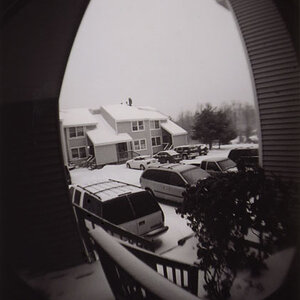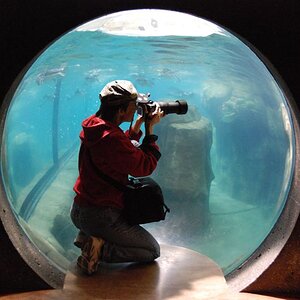jbylake
Dodging the Men in Black
- Joined
- Jul 23, 2009
- Messages
- 730
- Reaction score
- 35
- Location
- State of Confusion.
- Can others edit my Photos
- Photos OK to edit
I was thinking, and that's a dangerous thing for me...but here goes; just wan't to gather other's thoughts on this.
Film photography, while pretty much outdated, but still around, hasn't changed a lot over the last 40 years or so.
But technology has changed, and is continuing to change expotentially, every year or two, sometimes less.
Point in case, I remember asking a fellow photographer, in the mid to late 90's, if he thought that digital camera's would ever take over where film camera's were at the time. He thought I was nut's and swore that digital would never equal the resolution of film and a good lens.
Well, we know that was wrong. But, now we are moving from digital and IC base technology into the field of nano technology. So it took the PC since the late 70's to early 80's to get where we are now. As technology advances, it's rate of advancement is accellerating, expotentially, almost every day.
Where film camera's were around for years, could the NEW digital camera's, the one's that can be bought today, be outdated, with newer technology, at an astounding rate, as the rest of technology is? Will digital camera's, as we know it today, right now, be the floppy disks of tomorrow?
Get where I'm going here. I guess anything would just be conjecture, but I just thought it might be interesting to hear if others are thinking the same way....
J.:mrgreen:
Film photography, while pretty much outdated, but still around, hasn't changed a lot over the last 40 years or so.
But technology has changed, and is continuing to change expotentially, every year or two, sometimes less.
Point in case, I remember asking a fellow photographer, in the mid to late 90's, if he thought that digital camera's would ever take over where film camera's were at the time. He thought I was nut's and swore that digital would never equal the resolution of film and a good lens.
Well, we know that was wrong. But, now we are moving from digital and IC base technology into the field of nano technology. So it took the PC since the late 70's to early 80's to get where we are now. As technology advances, it's rate of advancement is accellerating, expotentially, almost every day.
Where film camera's were around for years, could the NEW digital camera's, the one's that can be bought today, be outdated, with newer technology, at an astounding rate, as the rest of technology is? Will digital camera's, as we know it today, right now, be the floppy disks of tomorrow?
Get where I'm going here. I guess anything would just be conjecture, but I just thought it might be interesting to hear if others are thinking the same way....
J.:mrgreen:




![[No title]](/data/xfmg/thumbnail/41/41937-bd46d08f9adcefe8bc65477f19a4f580.jpg?1619739947)









